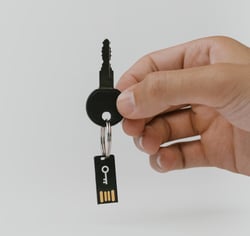Encrypted Backups of Apple Devices? The FBI Says No

According to a recent report from Reuters, Apple Inc no longer intends to allow iPhone users to fully encrypt backups of their Apple devices in their iCloud storage service after receiving complaints. And who would be able to halt a technological giant like Apple right in their tracks?
Well, the FBI, for one.
For years, there have been ever-growing conflicts between companies like Apple and investigative bodies like the FBI over internet privacy. Tech companies are concerned about their users’ privacy and safety online (and with good reason: in 2019, at least 7.9 billion highly sensitive records were exposed through data breaches.) Meanwhile, bodies like the FBI are focused on how user security and privacy settings can interfere with important investigations.
This proposed plan was designed to stop the ever-growing deluge of hackers and breaches we’ve seen in the past few years. There would be no possible way for Apple to unlock the encryptions, which means that the company would be unable to ever provide any data to investigative bodies like the FBI. This would cause a major hindrance to their investigations.
In the past, Apple and the FBI have had legal disputes over the issue of user privacy versus access to evidence. In 2016, the two entered a court battle over access to an iPhone used by one of the suspects in a mass shooting in San Bernardino, California. According to a former Apple employee, lawsuits like this made Apple nervous about being accused of denying authorities access to information about alleged criminals.
What This Means for Apple Users
So, for now, full end-to-end encrypted backups will not be available for Apple iCloud users. Does this mean it’s worth giving up on iCloud all together?
Not quite.
Although Apple is not able to offer fully encrypted backups at this time, the company has switched its focus to ensure they are still able to protect highly sensitive user information and still offers several strong security features.
According to Apple, “iCloud is built with industry-standard security technologies, employs strict policies to protect your information, and is leading the industry by adopting privacy-preserving technologies like end-to-end encryption for your data.”
On your iCloud, you are still able to have end-to-end encryption of several specific features and data points, including:
· Your health data
· Your passwords from saved accounts
· Your credit card and payment information
· Your Wi-Fi information and passwords
But, as a reminder, backed-up contact information and any messages from iMessage, WhatsApp and other encrypted services will still be accessible to both Apple and relevant authorities.
Keeping Your (Remote) Workplace Secure
Despite the encryption and safety features still available on iCloud and Apple devices, there is always a possibility that you and your employees could be vulnerable to a cyberattack.
Especially as remote working becomes more and more popular in the United States (in fact, from 2005 to 2017, there’s been a 159% increase in remote employees) it’s important to ensure that the networks and devices your company uses are protected. And sometimes, that means looking at security solutions beyond the ones simply provided by companies like Apple.
If you’re interested in reviewing the state of your company’s remote IT security, we have you covered. Download our free Remote Employee IT Safety Checklist for a comprehensive look at the steps to:
- Establishing security policies
- Securing your network for remote access
- Planning for crisis scenarios
- Tracking and protecting remote assets and more
To learn more about remote IT security and how Switchfast can help protect your data, contact us today.











